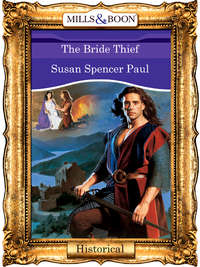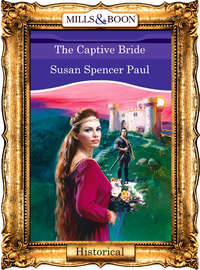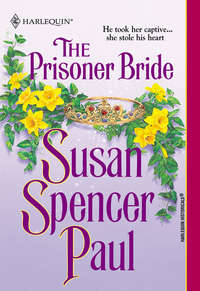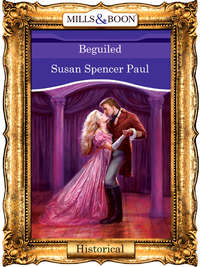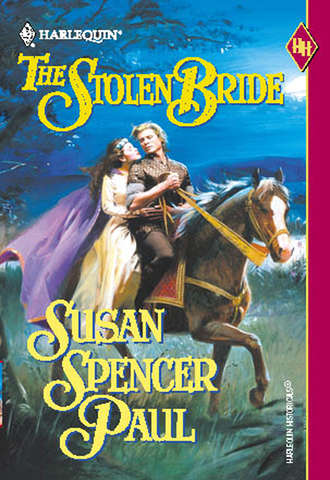
Полная версия
The Stolen Bride
Kayne’s resolve crumbled. John had never asked anything of him before, not even during the many years when they’d all been together, fighting in France.
“Aye,” he murmured, setting his fingers over the hand that John yet held on his arm. “For you, my brother, I will go. If it will ease your mind, you may come with me.”
“Surely you didn’t think we’d let you go alone?” Senet said from where he stood, leaning against a tree, his arms folded over his chest in a relaxed manner. “You’re a brave fool, Kayne, but even you will admit to dreading such a first encounter. We know you too well to think that it would be otherwise.”
Kayne smiled at his friend’s teasing tone. “Aye, you knave, I admit it. Any man would feel the same, I vow. ’Twill be much like going into battle. But I have done that many a time before, and can do so once more. You need not go with me, to coddle me as if I were a child.”
Senet sighed and pushed himself upright. “Nevertheless, we will. Why do you not come with us now, back to Lomas? We’ll spend Midsummer Day there and begin for Vellaux the following morn. I’ll send your father, Lord Renfrow, a missive telling him of our coming.”
“Nay, do not,” Kayne said with a shake of his head. “’Twould be easier to meet him without formality. He must take me as I am, when I come to him. Give me a week to prepare and close my shop. I will meet you at Lomas on the seventh day.”
“Are you certain?” John asked. “Can you not come with us now?”
“Nay,” Kayne said. “There is something of import that I must do tomorrow—on Midsummer Day. Someone I must meet.”
Both Senet and John looked at him with open interest.
“Someone?” Senet repeated with a grin.
“Aye, someone,” Kayne said testily, “and you may keep your thoughts to yourself, my lord. You’ve no need to fear that I will be delayed in coming to Lomas. I’ll meet you there at the end of next week, and we can begin for Vellaux. On my word of honor, we will.”
Chapter Five
The dancing began at midday, even before the feasting had taken place. Sofia refused the first few requests to join in the merriment when the music filled the air, hoping yet that Kayne would change his stubborn mind and arrive. She knew that he would be reserved—if he came—and would feel an outsider to the other villagers. It was her intention to stay by his side every moment, bearing him company to make his time as pleasing as possible. If he could but see that there was naught to fear from knowing and communing with his neighbors, mayhap ’twould be easier to lure him to such festivities in future.
It was a perfect day. The sun was bright overhead, but not too hot, and a cool breeze carried the many delicious scents of the faire across the fields where the festivities were taking place, down to the banks of the river, where children were already making small boats out of leaves and twigs, and even into the forest, where young couples sought the shelter of the trees to share stolen kisses or begin searching for the fern blossoms which became imbued with great power in the coming darkness of this most magical of nights.
Sellers had set out their wares—jewelry, flowers, toys, herbs, medicines, crafts of every kind and a variety of foods. Great mounds of wood were being set out for the bonfires that would later be lit, and many smaller fires were already being used to roast whole pigs and haunches of venison and beef.
All the village maidens, Sofia included, had twined ribbons in their hair and adorned themselves with circlets of flowers, and were brazenly teasing and dallying with the young men. The young men, apart from admiring the maidens, were waiting for the contests to begin in order to prove their strength and prowess in such skills as archery, running and wrestling. There were prizes for the winners of each contest, all to be awarded with great ceremony by Sofia’s father, Sir Malcolm, who was already strolling amongst the feasters, merrily jesting and laughing and drinking far too much ale and wine. When the dancing began, Sofia noted, her father was one of the first to take a pretty maiden by the hand and draw her in among the other dancers.
“Will you not dance, Mistress Sofia?” Olvan, the cobbler’s handsome eldest son, cried out as three maidens laughingly pulled him toward the music.
Sofia smiled and shook her head—then laughed along with the maidens as Olvan stumbled at their urgent tugging and quickly righted himself, flushed with pleasure at being so sought after by the fairer sex. Everyone, it seemed, was smiling and laughing, and Sofia suddenly twirled about with her arms wide, uncaring of who saw. She felt gladsome and free and happy beyond measure. Could anything be better—or rarer—than a day of ease and pleasure?
She stopped spinning and closed her eyes, feeling the warmth of the sun upon her upturned face, thinking of what was to come. The feasting and games and contests, the sailing of wishes, and then, as night fell, the bonfires and music and merriment throughout. Oh, how she wished Kayne would put his stubbornness aside and come. He would enjoy himself so very much—
“Sofia.”
A cruel hand closed over her arm, pulling her about. Sofia’s eyes flew open to see the man who’s voice she’d already recognized.
Sir Griel.
He was dressed, as he always was, in black, and surrounded by a half-dozen of his fighting men. They were the only men present who were fully armed, as if for battle, and silence began to fall over the assembly as their daunting presence was noted.
Sofia drew herself up full height, refusing to let anyone see the fear that welled up at the memory of her last meeting with Sir Griel. His fingers gripped her in the same steely manner as he had done then. Sofia made one effort to wrench herself free, saw his amused smile, and fell still.
“My lord,” she greeted coldly.
“Mistress,” he replied, still smiling. “You are very beautiful this afternoon. But this, to my partial view, is as you ever are.”
Sofia gave no answer to this, sickened by the way his gaze moved over her in so brazen and lecherous a manner.
“You have come to make merry for St. John’s Day?” she asked, calling the day by its church-given name, rather than what it had been known by since time began. “You have not honored us with your presence on such occasions before. I’m certain the people of Wirth are most pleased to have you attend their festivities.”
“But not you, Sofia?”
She lifted her chin.
“I have come,” he said, “but only to celebrate the day with my lovely betrothed. To bear you company both the day and night long, as Midsummer is surely among the most romantic times of the year. A day for maids to discover who their husbands might be. But you’ve no need of such as that, Sofia—” his tone grew softer “—for you already know who that man is. Do you wish to dance?” His grip tightened and he moved as if to draw her toward that place where the other dancers had fallen still, watching them.
“Nay, the music has stopped,” she told him, struggling in vain as he dragged her along. “There is no more dancing.”
“There will be music, presently,” he promised. “Where is your father? We will make him useful—though he is seldom so.”
The crowds melted away at Sir Griel’s approach, and Sofia could see her father, standing in the midst of the now still dancers, clutching his partner’s hand and gaping at Sir Griel in open fear.
Suddenly their way was blocked by a tall, muscular figure. Sir Griel actually ran into the man, so sudden and unexpected was his appearance, pulling Sofia into the same collision.
“Mistress Sofia.”
She looked up at the sound of Kayne’s voice, almost afraid to believe that it was truly him. But it was, and he stood before Sir Griel like a strong, immovable mountain, completely unafraid.
“Master Kayne,” she whispered. She was so glad to see him.
He held out his hand, holding her gaze, not even looking at Sir Griel.
“I’m sorry to be so late. We had arranged to meet much earlier. Come and teach me to dance, as you promised.”
She gratefully set her free hand in his, smiling up at him.
“Yes,” she began, just as Sir Griel, yet holding her other hand, tugged so hard that she slipped free of Kayne’s reassuring grasp and fell against her captor.
“You overstep, blacksmith, to address Mistress Sofia in so forward a manner,” Sir Griel warned in a low voice. “Move out of our way.”
Kayne stood where he was, still ignoring Sir Griel. He reached out to take Sofia’s hand once more, and, with a violent motion, Sir Griel shoved at him, unsuccessfully trying to push him aside.
“Move now!” Sir Griel shouted furiously. His men, as one, drew their swords and stepped nearer. Except for the sound of the river running nearby and the wind rustling in the trees, the silence from those attending the festival was complete.
Kayne gazed into Sofia’s eyes with what seemed to her an ineffable sadness, then he sighed and, at last, looked at Sir Griel.
“I do not wish to make trouble, neither do I desire a fight,” he stated calmly. “I carry neither sword nor dagger.” He held his arms out from his sides to prove the truth of the words. “But I will not move until you have released Mistress Sofia and let her make a free choice of who she will go with.”
Sir Griel looked at Kayne as if were a madman seeking certain death.
“Mistress Sofia is my betrothed,” he said with ill-concealed fury. “She has no free choice in any matter, and will do my bidding.”
Kayne was clearly unperturbed by this.
“No banns have been read to proclaim your coming union,” he said, “and Mistress Sofia wears no betrothal ring marking your possession of her. She herself has openly denied any such betrothal, to which many who are present can readily bear witness. By what right or law, my lord, do you make such a claim?”
Sir Griel’s face had turned red. “By my own law and none other!” he shouted. “Fool! I’ll see you dead for such insult!”
The biggest of Sir Griel’s fighting men lifted his sword and moved as if to strike Kayne. Sofia cried out with dismay, but Kayne moved so quickly that the other man never had a chance to so much as touch him. With an easy, fluid movement, Kayne bent, avoiding the blow of the gleaming sword, and picked the big man up. Just as easily he tossed him in a wide arc to the ground, where he landed with a loud thump.
Before Sir Griel’s other soldiers could fall upon him, Kayne had snatched up the fallen man’s sword and turned to face them. The first two were dispatched as quickly as the first, without an exchange of swordplay, and the other three stood back, holding their swords aloft and staring at Kayne warily, clearly unnerved by his calm and confident manner.
“Why do you wait?” Sir Griel shouted. “He is but a village blacksmith! Take him!”
One of the remaining men made the attempt, running at Kayne in a furious charge. Kayne didn’t move until his opponent’s sword was nearly at his chest, then with a flick of his own sword pushed the sharp blade aside and, using his fist, struck the man soundly on the head so that he crumpled to the ground beside his groaning comrades.
The remaining two men stood their ground. One was shaking his head and staring at Kayne with disbelief.
“He is no common blacksmith, my lord,” he told Sir Griel.
“Nay,” Sir Griel muttered, eyeing Kayne with a thoughtful frown. “That he is not. But we will see what he is.” He shoved Sofia away so abruptly that she stumbled and nearly fell to the ground. Keeping his sword at the ready and his eyes on his opponents, Kayne reached out a hand to pull her near, and Sofia gladly went. The warmth and strength of his body were a comfort beyond measure.
She was as shocked as everyone else present at the deftness Kayne the Unknown had displayed in dealing with Sir Griel’s seasoned fighters. It had been almost too simple a matter, as if they’d offered him not the least cause for trouble or worry. And the way in which he held the heavy sword in his hand—as if it weighed less than a feather—was even more amazing. She knew that Kayne had been a soldier once, but he fought like a much greater man.
Sir Griel rubbed a heavily gloved hand over his dark beard and considered Kayne thoughtfully. At last, with a nod of satisfaction, he spoke.
“It was once the custom on Midsummer Day for two men to take up the separate halves of the Sun King—his dark and light sides—and battle for the favor of a lady. I challenge you to such a battle.”
“That is a pagan custom,” Kayne replied, “and not countenanced by the Church. I will not fight you without just cause.”
Sir Griel’s shaggy eyebrows rose. “You fought my men.” He swept a hand at the pile of groggy men who, with the help of their two unwounded friends, were finally beginning to come back to their senses.
“Nay,” Kayne replied, shaking his head. “I defended myself, as well as Mistress Sofia. I will fight no man for game or pleasure. It is a vow I have taken.”
Sir Griel’s eyes widened with amazement, and then, after a short silence, he began to laugh, loud and lustily, as if he’d never heard anything so amusing in his life.
“A vow?” Sir Griel repeated after some minutes, still chuckling. “N-not to fight? But you jest, blacksmith. Surely you do.”
“I do not,” Kayne stated. “I will not fight you.”
Sir Griel’s black eyes still glittered with amusement. “I did not intend to attempt the task myself. There is one whose fealty I own—a knight of great renown—who I meant for the contest.”
“You would send another to take your place?” Kayne tilted his head to one side as if this amazed him. “But surely you, being also of the knighthood, are not afeared?”
Anger possessed Sir Griel’s features once again, and he replied tightly, “I’m afeared of no man, blacksmith, and far less of you. But I’ll not make a contest of what is already mine, as Mistress Sofia is.” He cast a threatening glance at Sofia that made her tremble. Kayne’s strong hand steadied her. “And I’d never lower myself to fight a knave such as you are. I was knighted by the hand of the king’s own regent, and have fought more battles than you could ever begin to dream upon, blacksmith.”
Kayne smiled at this, though very grimly. Standing so close beside him, Sofia could feel his body tensing at Sir Griel’s words.
“Mistress Sofia is her own,” he said in a low voice, “and no one else’s, until she decides otherwise. Take your sword and go in peace.” He held the weapon out to one of Sir Griel’s men, all of whom were now standing once more.
“I will go,” Sir Griel said, “but I will return with my warrior. And then we shall see whether you will fight.”
Kayne held his gaze. “If your man attacks me, even though I am unarmed, I will defend myself. If you should threaten harm to Mistress Sofia or any innocent person, I will stop you. And any man who will accost or bring harm to a woman, be she child, maid, mother or grandmother, him I will justly punish and not know a moment’s sorrow. These are promises I give you, my lord. You would do well to heed them.”
Sir Griel’s expression was as hard as stone. “I heed no man save the king, and such insolence as you possess invites challenging. I begin to think my man is right. You are no common blacksmith.” He stepped closer. “Why do they call you Kayne the Unknown?”
“That is for you to decide,” Kayne said. “I will bid you good day, my lord, and wish you a pleasant Midsummer Day.”
“Wish it to me later—if you are still alive to do so.” With one last glare at Sofia, Sir Griel turned and strode away, his men fast on his heels.
Slowly the crowd began to murmur, but once Sir Griel and his men had ridden away the murmuring turned into a loud chorus of voices, most of them filled with awe. Kayne turned to Sofia and opened his mouth to speak, but before he could utter a single word he was surrounded by dozens of onlookers, slapping him on the shoulder and heartily congratulating him.
Sofia watched with a measure of amusement as Kayne nodded and thanked his sudden admirers. He tried to maintain his usual stoic, somber manner in the wake of such much good cheer, but his cheeks were pinkened and he looked fully discomfited by so much attention.
When the well-wishers moved away, he looked down at Sofia and asked, “Are you well?” He released the hand he’d yet been holding and gingerly touched her arm where Sir Griel had gripped it. “Sir Griel gave you no harm?”
“Nay, I am fine,” she assured him, “though only because of your great bravery. I am in your debt again. Thank you.”
His clear blue eyes regarded her steadily, as if he didn’t quite believe her. “You’re still shaking. Come and sit in the shade.” He lightly grasped her elbow and led her toward the river. As they walked, he looked about and said, somewhat grimly, “Your father disappeared almost as soon as Sir Griel and his men arrived.”
“He’s not very brave,” Sofia admitted.
“Nay, he is not,” Kayne agreed. “Not even for the sake of his own daughter—his only child.”
Large oak trees grew along the riverbank, and their shade was much sought after by the feasters. But as Kayne and Sofia approached, all those near the river stood aside, making way for them with broad smiles and knowing winks. Kayne scowled and ignored them, choosing a private place to sit a bit farther from the water, beneath a tree where a small patch of grass made a more comfortable place to sit.
Sofia gave a sigh of relief as she tucked the skirt of her surcoat about her legs. “It began as such a wonderful day,” she said. She looked up to where Kayne was standing, leaning against the tree with his arms folded across his chest. “You came,” she said, as if she’d only just realized it.
“I came,” he replied, “and now that I am here, you will do as you said and make me your promise.”
Sofia didn’t know what he meant at first, but finally she remembered. “You are good to have helped me today—and also before, but I cannot ask you to rescue me every time Sir Griel behaves in such a manner. I am already afraid that he will do what he can to kill you for what you have done this day alone.”
“Sir Griel is a knave to be wary of, just as I told you,” he said, “but I am a careful man.”
Sofia gave a slight shake of her head. “You have just told him that you will not fight, save to defend yourself and others. ’Tis a powerful advantage you’ve given him.”
“Mayhap,” he said with a slight shrug. “But mayhap I have taken an advantage, as well.”
“I do not understand you, Kayne the Unknown. I dislike sharing any belief with Sir Griel, but he spoke aright when he said that you are not a common man. And not a common soldier. You fight like no other I have seen.”
“And you have seen many battles, then?” he asked, a smile tilting his lips.
“Nay,” she said, frowning, “but I have attended tournaments in plenty. Not even the most seasoned knights had such skill as you showed this afternoon.”
“Then they never served in France. Even common soldiers learn how to fight well—very well—when enough battle makes it necessary. If they do not, they die.”
Two young women approached them, one carrying two tankards of ale and the other a basket brimming with choice bits of roasted meats, chunks of bread and cheese, and a variety of the many sweets being offered at the faire. They were gifts from many of the sellers, in gratitude for what Kayne had done in keeping Sir Griel from ruining the day.
“Thank you,” Sofia said, accepting the basket and setting it on the ground. The young women blushed and smiled at Kayne as he held out his hands to receive the tankards. When he murmured his own thanks, they giggled behind their hands and then curtseyed and hurried away. Kayne gave a shake of his head, watching them depart, and Sofia laughed.
“You will have every maid in Wirth in love with you,” she told him, “and every man jealous of you.”
Kayne sat beside her, handing her one of the tankards. “I will pray it is not so. Women destroy a man’s peace more easily than swords and arrows. Especially women in love.”
Sofia smiled to cover the pain the words wrought in her, and said, a little too merrily, “Are you hungry, Master Kayne?”
“Aye. It is one of the reasons I came. To eat and dance and…and to make merry.” He sounded as if he were embarrassed by the words. Before she could reply he added, in a firmer tone, “You have not yet given me your promise, Sofia.”
“Please, let us not speak of Sir Griel now,” she said, handing him a linen napkin filled with the choicest bits of meat. “Let us eat and dance and prepare our boats for making wishes.”
He looked stubborn, as if he would press the matter, but Sofia touched his hand and murmured, “Please, Kayne. Only let us enjoy the day. I will give you my promise when ’tis done, I vow.”
“Very well,” he agreed reluctantly, “I will wait. But only ’til dark falls. Then I will have your promise regarding Sir Griel.”
“Aye,” Sofia agreed demurely, “you will have it then.”
Chapter Six
Sofia found reason upon reason long after dark had fallen to put off making her promise—there was dancing to be taught, more feasting to be done, and they most certainly had to watch all of the contests and games—until Kayne began to wonder why so simple a matter troubled her so. But those moments that he did think of it were fleeting. Sofia had a talent for making him forget everything…save her.
He had dallied with pretty maids before, especially at Briarstone and while he was in France. He knew the pleasure of a woman’s smile, of holding a soft, feminine body close to his own as they twirled about in a dance—despite his great clumsiness and lack of skill. But what he had experienced before was as nothing compared to receiving Sofia’s smiles, or of holding her as closely as he dared before so many watchful and interested eyes.
He had never seen her like this before. Today, she wasn’t the lady of Wirth, ever concerned with the welfare of those beneath her care. Today she was all laughter and gaiety, so carefree and open and free of spirit that he couldn’t think of words to describe it, and so beautiful—God’s mercy, she was so very beautiful. He could look at her forever and never grow weary, regardless of what time would do to age her. Sofia’s beauty was far beyond the physical, though heaven knew that she was passing all pleasure to gaze upon. It was something that shone out from within, from her beguiling blue eyes and that bewitching smile. And that was just what he felt she had done—cast some spell to captivate him so entirely. It was a feeling Kayne didn’t like in the least, but knew himself as being helpless against.
Teaching him to dance properly was the first task Sofia set herself to once they’d finished their afternoon repast. Kayne was terrible at such a fine skill, and knew it. More times than he could remember he’d made the attempt to learn the simplest steps, but it had ever proved impossible. In the end, he’d merely moved about as best he could and tried not to knock anyone over. He had noticed, with a measure of relief, that he wasn’t alone in his clumsy attempts, and that others dancing near him had seldom taken offense at his lack of grace.
It was much the same in the waning afternoon of Midsummer Day as Sofia tried to teach him to dance, but a far greater pleasure than any previous attempt Kayne had made. She held his hands and made him watch her movements—this he did willingly and with much interest—and physically turned him about in time to the music. To be so exposed to the curious eyes of the villagers would have been a torment to him before, but Sofia’s joy-filled smiles and bright laughter held him too enchanted to think of how badly he might be humiliating himself. Indeed, after but a few moments she had him laughing, too, most especially at his many missteps and mistakes. Being clumsy had never been so great a pleasure.
They danced for what seemed like hours, laughing, twirling, gasping for breath until Kayne had to cry for mercy. Sofia shook her head and called him a very poor creature, but took his hand and led him to a nearby booth where ale was being sold. Bearing their tankards in their hands, Sofia next drew him to the shade of a tree where they sat and watched the contest of archery. At first, Kayne’s years of warring came back to him and he began to think of the hundreds of archers who’d fought beside him in the king’s army, but the contest soon became so close between two of the men that he forgot the war altogether, and watched intensely as each of the archers strove to best the other.




